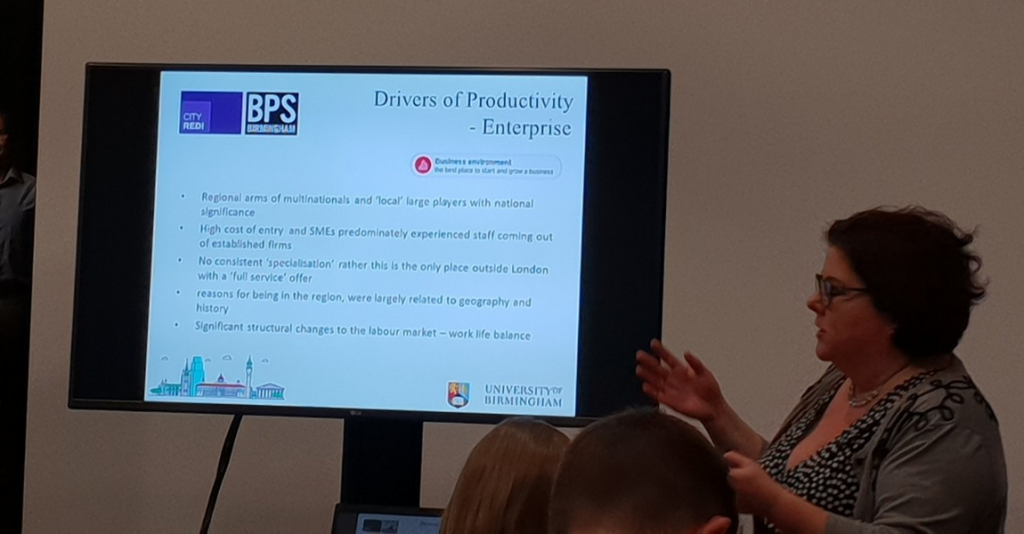 On the 7th November 2018, City-REDI hosted an event on the ‘Future of the BPFS sector’. Our event was one of 303 that took place across the UK, part of the 2018 ESRC Festival of Social Science, which aims to showcase social science research to diverse and new audiences. The event provided a unique opportunity for regional stakeholders involved with the Professional and Business Services (PBS) sector to come together to develop a greater understanding of the importance of the sector and the challenges it is facing now and ways in which these might be overcome.
On the 7th November 2018, City-REDI hosted an event on the ‘Future of the BPFS sector’. Our event was one of 303 that took place across the UK, part of the 2018 ESRC Festival of Social Science, which aims to showcase social science research to diverse and new audiences. The event provided a unique opportunity for regional stakeholders involved with the Professional and Business Services (PBS) sector to come together to develop a greater understanding of the importance of the sector and the challenges it is facing now and ways in which these might be overcome.
The Professional and Business Services (PBS) sector covers a range of diverse knowledge-intensive industries which provide specialised support to businesses and the public sector. Covered sectors include legal services, audit, accountancy, advertising and market research, management consultancy, architectural and engineering activities and recruitment activities.
Key Stats highlighting the significance of the sector:
- The Business, Professional and Financial Services Sector (BPFS) accounts for almost 11 percent (£186bn) of the UK economy’s gross value added[1] and 13 percent (4.6mn) of employment (House of Commons Committee on Exiting the European Union report, 2017).
- It is diverse, and many of its subsectors are knowledge-intensive and highly geographically mobile.
- The UK is a major exporter of PBS, providing 27 percent (£66bn) of the UK’s services exports (ONS, 2017). It is strongly competitive, being within the top three exporters of these services in the Organisation for Economic Cooperation and Development (OECD) in 2015 (with the US and France) (OECD, 2015).
- The PBS industry provides B2B services for other parts of the economy.
- The sector accounts for 25% of businesses (635k), with a turnover of £399bn, and business investment growing from £18.5bn to £34bn in 2016.
- Growth in the sector has been above average, since 2000, average annual GVA growth in PBS exceeded that across the UK economy by almost 3 percentage points.
- In employment, growth in workforce jobs has exceeded total job growth by almost 2 percentage points[2].

The Agenda
The agenda for the event divided into two parts:
- Presented the findings of recent City-REDI research on the PBS sector:
- ‘Deep dive’ study on the PBS sector in the West Midlands, as part of the Skills and Productivity Commission work and Industrial strategy
- Research commissioned by BEIS, aiming to explore and identify national and local barriers to the growth of the PBS sector in areas outside of London.
- Reflected on how findings should be built into the Local Industrial Strategy:
- The focus of the strategy in relation to the sector
- Developing an action plan
The second half of the event on the local industrial strategy was led by Hilary Smyth-Allen (GBSLEP – Lead for BPFS sector consultation), who has worked alongside City-REDI on supporting the West Midlands and National sector work. Hilary presented the current activities around the local industrial strategy by the GBSLEP and facilitated a discussion with the audience, asking: (i) Does the plan fit the evidence base?; (ii) Is there anything obviously missing or would make a big difference if it was added in; and (iii) What should be the role of the public sector in supporting the growth of BPFS?
If you want to learn more about the sector consultation, Hilary can be contacted on Hilary.Smyth-Allen@birmingham.gov.uk.
The Research
The UK Government published its ‘Industrial Strategy: building a Britain fit for the future’ in November 2017 and identified Places – alongside People, Infrastructures, Ideas, and Business Environment – as one of five foundations of its approach to transforming the UK economy. This strategy highlighted that whilst cities, towns and rural areas have competitive advantages that will be essential to shaping the UK’s economic future, many geographic areas in the country are not realising their full potential. In fact, the UK has greater disparities in regional productivity than other European countries and English cities outside of London do not reflect the productivity found in other communities across Europe.

This suboptimal performance presents an opportunity to increase productivity and welfare by making better use of local assets, ensuring that every region in the UK is enabled to play a role in boosting the national economy. The Professional and Business Services (PBS) sector is an example of a local asset that already plays a role in supporting inclusive growth across regions and sub-regions of the United Kingdom. It does this through growing in its own right as a sector, whilst also supporting the growth of firms in other sectors and supporting the delivery of efficient services in the public sector. By removing any barriers to growth that this sector may be experiencing it will help PBS firms to continue to grow and increase productivity across other sectors.
This relationship between the PBS sector regional productivity was recognised by the West Midlands Combined Authority’s (WMCA) Productivity and Skills Commission, who commissioned a ‘deep-dive’ study into the sector. This research was carried out by City-REDI, in partnerships with Deloitte and Business Professional Services Ltd and aimed to address the following research questions:
- Does improving the sector or changing the sector improve across the board?
- Which parts of the sector need investment and what type of investment?
- How do we lock in the companies to the region and ensure the economic benefits remain here?
- Can we create real (or better) estimates of productivity, real wages etc?
- What interventions have been delivered elsewhere, in the sector and other best practice can we hook into to identify potential opportunities for the sector?
The ‘deep-dive’ involved thirty-four qualitative interviews with PBS firms from across the West Midlands and were conducted by members of the City-REDI team. Additionally, there were three dedicated focus groups. The focus of the interviews was on medium and large organisations based in the West Midlands, likely to see growth large enough to impact on regional GVA within the ‘Strategic Economic Plan’ time period.
The key findings from this WMCA research can be found here.
Meanwhile, at the national scale, to support engagement with the sector and support policy formulation the government established the industry-led Professional and Business Services Council (PBSC). The council is made up of representatives from the PBS sector and is co-chaired by a BEIS minister. BEIS commissioned City-REDI to conduct a further piece of work to feed into the work of the PBSC and aimed to explore and identify national and local barriers to the growth of the PBS sector in areas outside of London.

Our approach enabled us to examine two types of areas in relation to the sector at extreme ends of the place continuum for sector size and presence. This has allowed us to understand the needs of very different places, highlight differences where a local industrial strategy may need to act and similarity where there are opportunities for national action and intervention.
Our research aims were as follows:
- Investigate the idea that the PBS sector has the potential to support regional economies and help them to thrive
- Contribute to the understanding of Local Industrial Strategies (LIS) and suggest ways to unlock support from industry
- Develop the evidence base to support the development of a shared strategy between industry and government to bolster the PBS sector outside of London
The research brief stipulated that evidence should be collected from two contrasting geographical areas outside of Greater London to provide insights into the differing level of change needed with the attendant impact on the local economy. One area was to be characterised by a high concentration of PBS firms, with the potential for accelerated sector growth from its current position of strength. The second was to be an area where the PBS sector has a lower level of presence and could be expanded. Birmingham and Darlington were selected as the two contrasting areas, based on an analysis of the PBS sector by Local Authority by BEIS.
This research on Birmingham and Darlington focussed on addressing the following questions:
- How can PBS firms help the growth of local non-PBS firms, for example through masterclasses, mentoring, and advice on recruitment, training, advertising, marketing, accountancy or legal issues?
- How can PBS firms help local non-PBS companies to increase export opportunities?
- How can PBS firms help local areas to increase non-PBS inward investment from elsewhere and improve their wider economic and social infrastructure?
- What barriers exist to the growth of the PBS sector in each local area?
- What types of business support would address identified barriers and issues?
- What would make each local area more attractive for PBS firms to expand their existing business?
- What conditions in the local area would make it more attractive to PBS firms to further invest in the sector, e.g. infrastructure, transport networks, community safety, developing the right types of workspace, educational institutions/schemes and links to other sectors?
- How can each local area ensure that the PBS talent pipeline is sufficient and of quality?
- What would make the PBS firms’ services more attractive to non PBS local businesses?
The draft report from outlining the findings from this research are currently with BEIS, with the aim to publish the report in the new year.
[1] GDP(O) Low Level Aggregates National Accounts ONS, 2017
[2] Source: Overview of UK Professional and Business Services Sector, BEIS, March 2018
This blog was written by Dr Chloe Billing, Research Fellow, City-REDI, University of Birmingham
Disclaimer:
The views expressed in this analysis post are those of the authors and not necessarily those of City-REDI or the University of Birmingham
To sign up for our blog mailing list, please click here.
